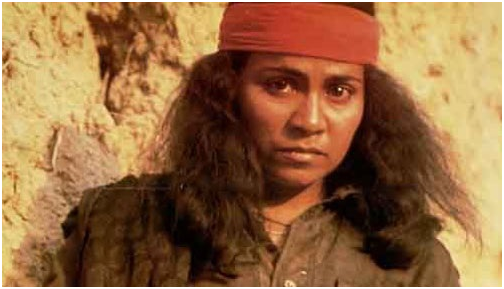India's Seema Biswas Heads To Cannes

Seema Biswas answered her mobile promptly when I called to congratulate her on yet another coup: her latest film has been selected for the 69th ‘Festival de Cannes, world cinema’s annual crowning glory.
But Seema did not know of her latest coup! Taken aback, she asked, “Which film?” Then it dawned on her. A short while later, she received the official email inviting her to the Cannes screening of 'A Yellow Bird'. Typical Seema, immersed in her work, quietly accepting the kudos, without fuss. Success is not really new to her.
This is news that lifts the spirits in a year when India at Cannes edges into its main sections with just one film. Only none could be worse. The saving grace is Anurag Kashyap’s latest, ‘Psycho Raghu’, on Mumbai’s notorious serial killer, which promises to be an audience bone chiller. It has been selected for the very hard-to-please ‘Director’s Fortnight’.
The ‘Fortnight’ was started nearly half a century ago by the French Directors Guild. François Truffaut was a key force there. It was born as a parallel Cannes celebration of the Director’s centrality in cinema.
Tamil continues to be a favoured Cannes flavour. Two years ago, ‘Dheepan’, a Tamil film by famed French director Jacques Audiard, won the the Palme d’Or, Cannes’ top laurels. The film, ‘A Yellow Bird’ that takes Seema to Cannes this year is also in Tamil, with a mix of Mandarin, English and Hokkien. This Singapore-France co-production is the debut feature by an ethnic Indian filmmaker, K. Rajagopal, originally from Kerala whose great grandfather migrated to Singapore.
This self-taught filmmaker has award winning shorts to his name.
‘A Yellow Bird’ features in ‘Critics Week,’ the highly selective competitive section of seven features and seven shorts reserved for a first or a second film by its maker. ‘The Yellow Bird’ also has the honour of opening the section, when Cannes viewers are eager and fresh-faced awaiting the curtain rise on new cinema joys. Midway, the going gets a bit jaded.
‘A Yellow Bird’ is about the 38-year old convicted smuggler Siva who, when released after eight years, starts searching for his ex-wife and daughter. They left him without leaving a trace. His journey leads him to a terrible truth. Seema plays the man’s beleaguered mother, barely able to make ends meet, suddenly faced by her errant son. Her role has little dialogue (in Tamil, she is Assamese) but depends very largely on expression, which Seema delivers sublimely.
The title “A Yellow Bird’ is one that Rajagopal attributet to his mother. She told him as a child that when he saw a yellow bird he would be blessed with good news or meet someone kind and gentle. He says, “For me, it represents hope at an unexpected moment. It is almost unreal. You do not know for sure if it exists. That is why in the film we see a yellow bird only in a single scene – and then it is lifeless. There are species of birds which would prefer death to captivity. Similarly, I question what happens when one is forcefully taken out of one’s natural habitat?”
Seema Biswas’ film career internationally has been meteoric from 1994 when she startled the world with her bristling performance in and as ‘Bandit Queen’ (which also shot director Shekhar Kapur into the international arena). A quarter of a century later, this slight actor from Assam, who bears no trace of the frills and postures of the ‘star’, has risen to be the darling – the primary choice – of discerning directors both in India and abroad.
Whether the role is big or small, Seema attacks it headlong if it’s a script she likes and a character she values. She featured in Roland Joffe’s memorable ‘City of Joy’ (1992). Deepa Mehta turns to her at every opportunity, giving her unforgettable roles. Australian director Paul Cox cast her in a lead role in his latest film ‘Force of Destiny’ and has scheduled her for his next. Her appearance in Indian films has been a steady outpouring of an immense, multivalent talent. Her latest is the Assamese film , ‘Kathakodhi’, an enticing tale that infuses local myths into daily life, now doing the festival rounds (Indian Film Festival of Los Angeles to the London and Stuttgart fests and soon, hopefully, in Melbourne, Australia).
Anurag Kashyap comes to Cannes fresh from the success of his raunchy 20-minute segment, ‘Clean-Shaven’ in a compendium film ‘Madly’, which he shares with five other directors. Here, another actor who has established her mettle, Radhika Apte, bagged the Best Actress award at Tribeca (New York) where the film premiered, astonishingly winning over actors in feature length films.
The Cannes Classics, devoted to commemorating cinema for posterity, screens an Indian feature length documentary, ‘The Cinema Travellers’, a debut work by Shirley Abraham and Amit Madheshiyam.
In another section, Cinéfondation, which lauds student films, the Satyajit Ray Film and Television Institute, Kolkata, flaunts yet another feather in its cap with its student film ‘Gudh’ (The Nest) being an official selection. It is directed by Saurav Rai.
Finally, there is the treasured ‘L'Atelier’ section ,where emerging film-makers with scripts worthy of their early promise are nurtured and mentored to make their cinematic journey a more confident one. It has the Bengali filmmaker Aditya Vikram Sengupta presenting his script Memories and my Mother . Sengupta’s quiet, contemplative first film ‘Ash Jaoar Majhe” (Labour of Love), impacted viewers powerfully when it premiered at the 71st Venice fest two years ago and won the coveted Fedeora Award for Best Director of a debut film.
Cannes Short Film Corner boosts newcomers rubbing shoulders with known names with their hard-to-sell shorts and documentaries. India, increasingly represented here, has over 40 entries besides quite a few made by directors living abroad whose films connect with India. And Cannes Market has a plethora of Indian players armed with their films, scripts and ideas that aim to reach the world scene.



